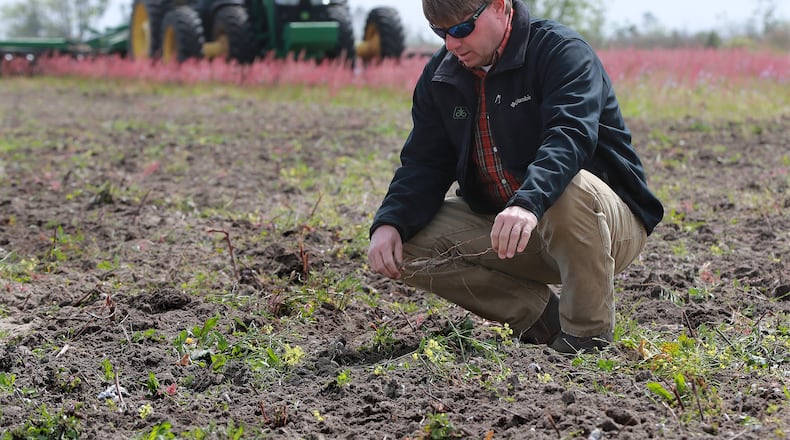Randy Hudson, a South Georgia pecan farmer, is going back to China in a few weeks. He’s trying to rebuild China’s connection to Georgia’s favored tree nut, a relationship he spent 20 years of his life nurturing.
While he’s there, he plans to request that U.S. pecans be granted a waiver from steep Chinese tariffs. But, given trade hostilities between the U.S. and China, “I don’t think that is going to be very well received,” he said.
It's the armpit of summer swelter in Georgia, yet local farmers feel a terrible chill. Pounded by a bevy of brutal conditions last year, growers are preparing to weather yet another storm — a decision by China to no longer buy U.S. agriculture imports.
Chinese authorities made that decision last week, in response to the Trump administration’s threat that it would place a new tariff on an additional $300 billion in Chinese goods starting Sept. 1. The administration announced Tuesday that it now plans to limit and delay the tariff. But it’s unclear if that will affect China’s plans.
Georgia farmers and surrounding communities that rely on cotton and pecans, two of the state’s biggest crops, are particularly at risk.
How much of a blow Georgia farms face depends on how China implements its cutoff of U.S. agricultural imports, said Gerald Long, a Bainbridge farmer and president of the Georgia Farm Bureau.
“We don’t know the extent of it by no means,” he said.
One thing is clear, he said: “This is just adds problems to the issues we have in agriculture. We have to get this trade behind us.”
Fallout from trade wars and sharply lower commodity prices have pummeled Georgia farmers, many of whom were also battered by Hurricane Michael and other tough weather last year, Long said. He felt it, too. The 70-year-old said he may lose money again this year on the 2,200 acres where he raises cattle and grows cotton, vegetables and other crops.
“I’m concerned,” he said.
Already depressed cotton prices sagged another 15% last week with the news out of China. That left prices well below many farmers’ break-even point, with harvest just weeks away for some Georgia farmers.
“That ain’t good,” said Clay Pirkle, a cotton grower in Ashburn.
He briefly wrestled with whether to keep irrigating his cotton, as he normally would, to maximize quality and yield of his potentially money-losing harvest.
“It is going to have a negative impact on the bottom line because I’ve lost a consumer of a quarter of my output,” he said.
The majority of U.S. cotton is sent to other nations, and China was easily the biggest buyer. The Chinese have cut back on purchases in the last year, though the country remains a significant customer, according to Richey Seaton, the Georgia Cotton Commission’s executive director.
China has increasingly turned to Brazil to meet its cotton needs.
“Hopefully, we can get some remedy to this dispute soon,” Seaton said. “We are basically losing our foothold on market share there.”
Pecan farmers, already smacked with a nearly 50% tariff by China, fret about that, too, and wonder if China, traditionally their biggest customer, might drop them for good, even beyond the current trade war. Georgia is the nation's largest pecan producer.
Lenny Wells, a pecan specialist and University of Georgia horticulture professor, said China was particularly good for the state’s pecan growers, buying direct from farmers instead of shellers and offering higher prices that boosted profits in rural communities.
“It pretty much revolutionized the industry,” Wells said. “We saw a rebirth of interest in pecans.”
Georgia added thousands of acres of pecan trees, year after year, until the trade war hit.
While many Georgians may not be aware of it, China has had a powerful influence on the state’s agriculture industry and rural communities, said Hudson, the pecan farmer in Ocilla and a retired University of Georgia professor.
That includes his home county of Irwin. He estimated that, counting multiplier effects, China has spurred hundreds of millions of dollars of spending in his area.
Chinese buyers purchased about 90% of what he sold two years ago. In 2018, that was down to zero. He said he was seeing signs of making some headway earlier this year before the trade battle heated up again.
Hard times from lower crop prices and damage from the hurricane have taken their toll, he said.
He praised Georgia elected officials who cleared the way for state aid, but federal disaster dollars have yet to be distributed to pecan growers in his area, Hudson said. Even when they do, they won’t fully cover farmers for their losses.
So he’s been battening down where he can at his Hudson Pecan Company. He held off on buying more farm land. He cut back on equipment purchases, spraying and mowing, and opted to hire fewer part-time workers.
“We are trimming costs everywhere we can,” he said.
Georgia’s top agriculture products by cash receipts in 2017, as well as their export value (in millions)
Cash receipts / Export Value
1. Broiler (poultry) meat: $4,376/$455
2. Cotton: $850/$660
3. Peanuts and products: $721/$535
4. Misc. horticultural products: $411/$248
5. Tree nuts $348*/$241
*includes fruits
Source: USDA figures via a policy brief from University of Georgia's Center for Agribusiness and Economic Development
About the Author
The Latest
Featured



